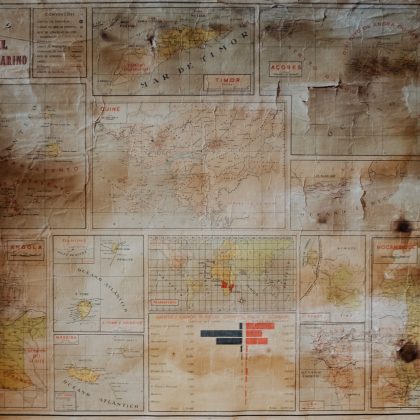One British Thing: A Bottle of Welfare Orange Juice
What does an empty bottle of concentrated orange juice have to do with colonialism? Some of you may remember the Welfare Orange Juice that the British government provided to pregnant women and young children from the middle of the Second World War until 1971. But most would quickly pass by this relic of the 1960s on a market stall. I use this remnant of a defunct and relatively unknown nutritional program to tell the story of the relationship between the post-war Welfare State and the processes of both colonial development and decolonization. This “British Thing” was one of millions of bottles of Welfare Orange Juice that the state initially provided free or well below cost to vulnerable members of the population as a vitamin C supplement. But in the post-war period the bottles themselves bore no trace of the fact that their contents came largely from Jamaica and British Honduras, colonies that had been encouraged to plant orange trees entirely for the purpose of supplying the British government with this juice, which had no commercial market and was furnished only to beneficiaries resident in the United Kingdom. The contract drawn up with West Indian suppliers was initially cast as a win-win situation: residents of the British Isles were provided with a much-needed dietary supplement at the same time as colonial subjects received the benefits of an agricultural development project. However, the benefit to colonial, and later Commonwealth, subjects was short-lived. Almost as soon as the newly-planted orange groves began to yield fruit, the British government attempted to withdraw from its purchase guarantees, eventually refusing to renew its contracts and then terminating the program. This bottle of Welfare Orange Juice thus opens up a more complex narrative of post-war Britain by putting the history of colonialism and decolonization in conversation with that of the Welfare State.
Free access to this “One British Thing” essay can be found here.
“One British Thing” is a new series in the Journal of British Studies that will introduce readers to an object that is, or should be, central to British History. “One British Thing” essays will either present a new reading of a well-known piece of British material culture or analyze objects that may be relatively unknown to the journal’s readership but deserve closer scrutiny. Contributions to “One British Thing” can choose to highlight how the study of material culture opens up new avenues of research, how a seemingly mundane object can tell a larger and more significant story about the past, and/or how a well-known “thing” can be read against the grain to reveal alternative or competing narratives of Britishness.
I will be curating this series for JBS and am interested in receiving ideas for submissions from scholars at any stage of their careers, working in any time period, who would like to share their “British Things.” As with all submissions to JBS, we welcome a range of disciplinary and geographically-expansive approaches to the study of Britishness. Please contact me with any ideas for “One British Thing” essays at n.durbach@utah.edu.





